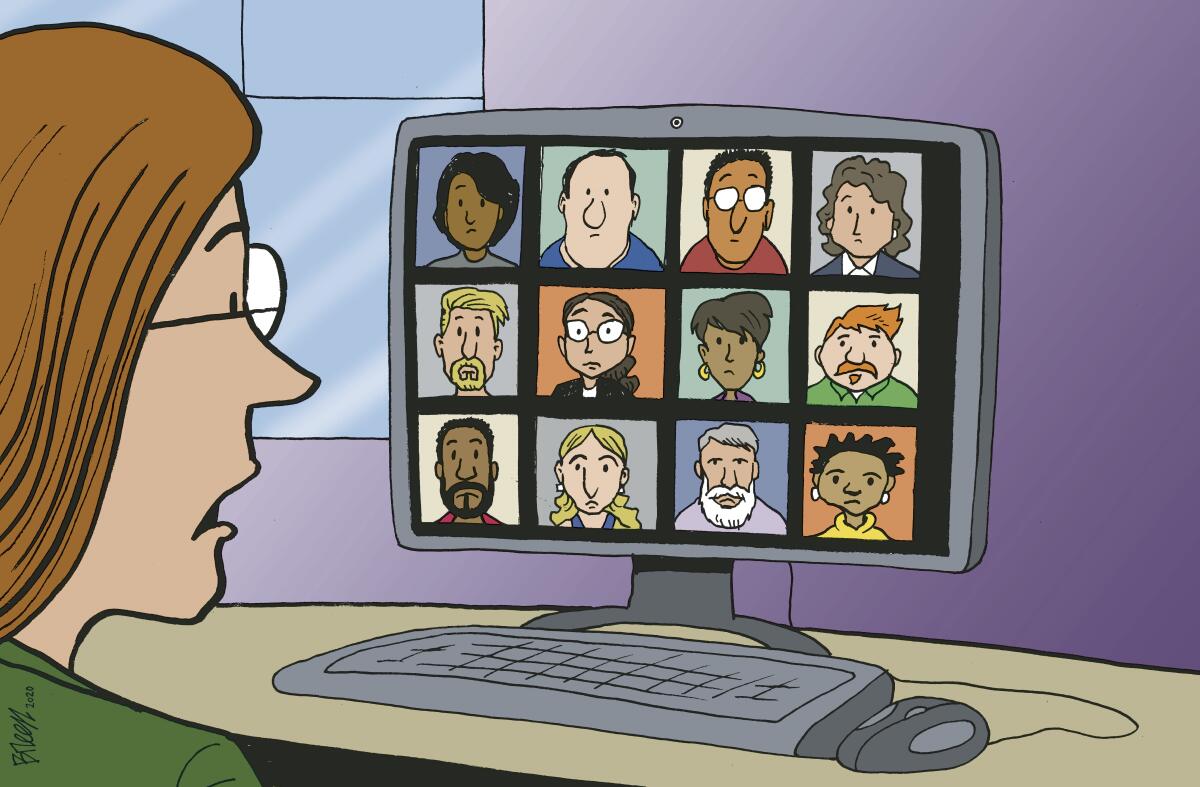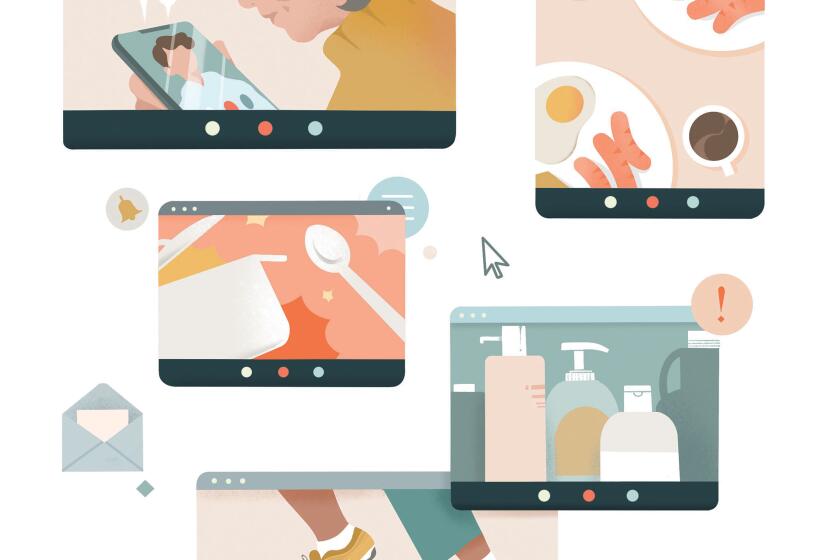Op-Ed: After my dad died during COVID, I resisted joining a virtual grief group. I shouldn’t have

It started like any pandemic-era Zoom meeting. I awkwardly angled my screen toward my bedroom wall to hide the clothes littering my floor. I changed into one of my button-up Zoom shirts. I joined others on screen. A gray cat slinked across someone’s keyboard. One participant struggled to turn on her video.
Then, suddenly, it felt very different.
The moderator asked everyone to say the name of their loved one who had died. “My mom, Dana.” “My dad, Hal.” “My friend, Laura.” “My husband, Robert.”
Four months before that Zoom meeting, my dad had died alone in his assisted living facility in Oakland. As he declined after a stroke, I chased him from a distance. I videoed my way into rooms I could not enter because of COVID restrictions and blew him kisses from behind a glass wall. There’d been no memorial, nothing. It was as if my dad had vanished into thin air.
The hospice program that had cared for my dad encouraged me to join a virtual grief group. I declined brusquely. My loss felt so private. The last thing I wanted was to share it with strangers. Besides, Zooming about grief seemed tacky, emojis and chat boxes so incongruous with the sanctity of death.
A few weeks later, my mom called. She’d received my dad’s ashes. They came in a dark box engraved with gold designs. I imagined a van full of these boxes shuttling across the country, delivering the dust of the dead like holiday packages. I pictured my mom, in her one-room apartment in Berkeley, with this box for as long as the pandemic dragged on. I was too sad to cry.
The next night, my cellphone alerted me it was running out of space. It was clogged with photos from friends in quarantine trying to text their way out of isolation. Scrolling through the photos, I came across the last one I took of my dad. He seemed real, too big for that small box. Instantly, I felt like I was holding a bomb about to detonate. I threw my phone across the room.
The next time a hospice counselor called, I said I was ready to join the virtual grief group.
I was nervous before my first meeting. I imagined I’d find Brady Bunch squares of grievers, a pixelated quilt of strange sad faces. I wondered if it made sense to sign up for more darkness. What I found, though, were heartbroken but whole people. Like me. Struggling through the pandemic and longing for a new future, while learning how to build bridges with loved ones lost to the past.
Every week a participant made a presentation about the person they had lost. We held frayed black-and-white photos of youthful smiling faces up to our screens. We shared color photos of these faces, sunken and weak. We talked about the lives lived in between.
As I showed photos of my dad, I felt suffocated by grief. Too choked up to talk, I closed my eyes. When I opened them, I saw group members crying with me. One gave me an air hug through the screen. Sitting in my bedroom alone, my loss felt shared, and lighter.
In our “Dispatches From the Pandemic” series, we bring you personal stories from people whose lives have been altered by COVID-19.
Technological glitches brought us closer, too.
One participant kept losing connectivity while trying to tell us about her mom. She frantically logged in again and again. Once she regained video, she fought futilely for sound. Her silent face caved in with pained defeat. These moments only reinforced how much we needed one another, former strangers, now friends in grief.
We shared milestones. In November, election anxiety muddied our mourning. At Thanksgiving, we hid from empty dining room chairs by eating turkey in our kitchens. Some decided not to send Christmas cards, not wanting them to be death announcements.
Our last meeting was the Monday before New Year’s Eve. With a new year and a COVID vaccine upon us, we pondered how we would reenter the world without our loved ones. “We are in the eye of the storm, it seems like help is on the way, but what will it feel like when the world reopens and starts spinning faster?” the moderator asked us.
I felt dread. Eventually, my dad’s assisted living facility will reopen to visitors. I’ll be allowed to go to the common room where we used to eat cookies. But it won’t matter because my dad won’t be there. I’ll be able to host dinners in my apartment. But my dad’s chair will remain empty.
For me, my group members, and many others, I realized, the reopening of society post-quarantine will cause a second period of grief.
There was solace, though, knowing I won’t be going it alone. I’ll likely never see my group members again. But I’ll carry them, like a blanket wrapped warm around me, a comforting reminder of the strength of human connection. Powerful enough to cross the vast virtual divide.
The final session ended unlike any other Zoom meeting I’d ever attended. The moderator angled her camera toward a table covered in candles. She lit them one by one for each person we’d lost. As we logged off, she whispered, “These candles represent your courage to comfort others. They represent the light of love.”
Rose Carmen Goldberg, a lawyer, is a lecturer at UC Berkeley School of Law.
More to Read
A cure for the common opinion
Get thought-provoking perspectives with our weekly newsletter.
You may occasionally receive promotional content from the Los Angeles Times.











